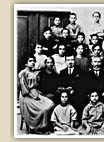
On the western coast of Asia Minor, in a natural environment that favours
communication and trade, a large number of Greek communities gathered. These
populations mostly lived in urban centres and were engaged
in trade and shipping or in liberal professions. As concerns the agricultural
sector, the Greeks of this area were for the most part engaged in commercial cultivation. The Greeks made themselves felt by building national, religious institutions
such as schools, including high schools, cultural clubs and foundations.
The geographical position of the Pontus favoured close ties with Russia. The communities
here were organized through the institution of notables, and their major occupations
were related to agriculture and wood-cutting.
Lastly, the natural isolation of Cappadocia affected the life of the
Greek Orthodox, who confronted serious problems in preserving the Greek language. Most of
them were Turkish-speaking, but remained Christian Orthodox. They were engaged
in arable and animal farming. In the late nineteenth century the use of the Greek language
was disseminated in Cappadocia and changes from Turkish names to
Greek names was often observed.
The policy of the Young Turks and the climate that had resulted from the wars of the
1910s, created a feeling of exclusion and terror for the non-Muslim subjects of the
Ottoman state.
After the Balkan Wars but especially during the course of the First World War,
Greeks suffered important persecutions and deportations. The Greek
state undertook to represent the political and national concerns of the Greek Orthodox community. After the end of the War the western areas of Asia Minor were
claimed for Greece; here Greeks formed the largest population density. The Catastrophe
of 1922 and the Exodus signaled the end of the presence of the Greek Orthodox communities
in Asia Minor.
|
 |
